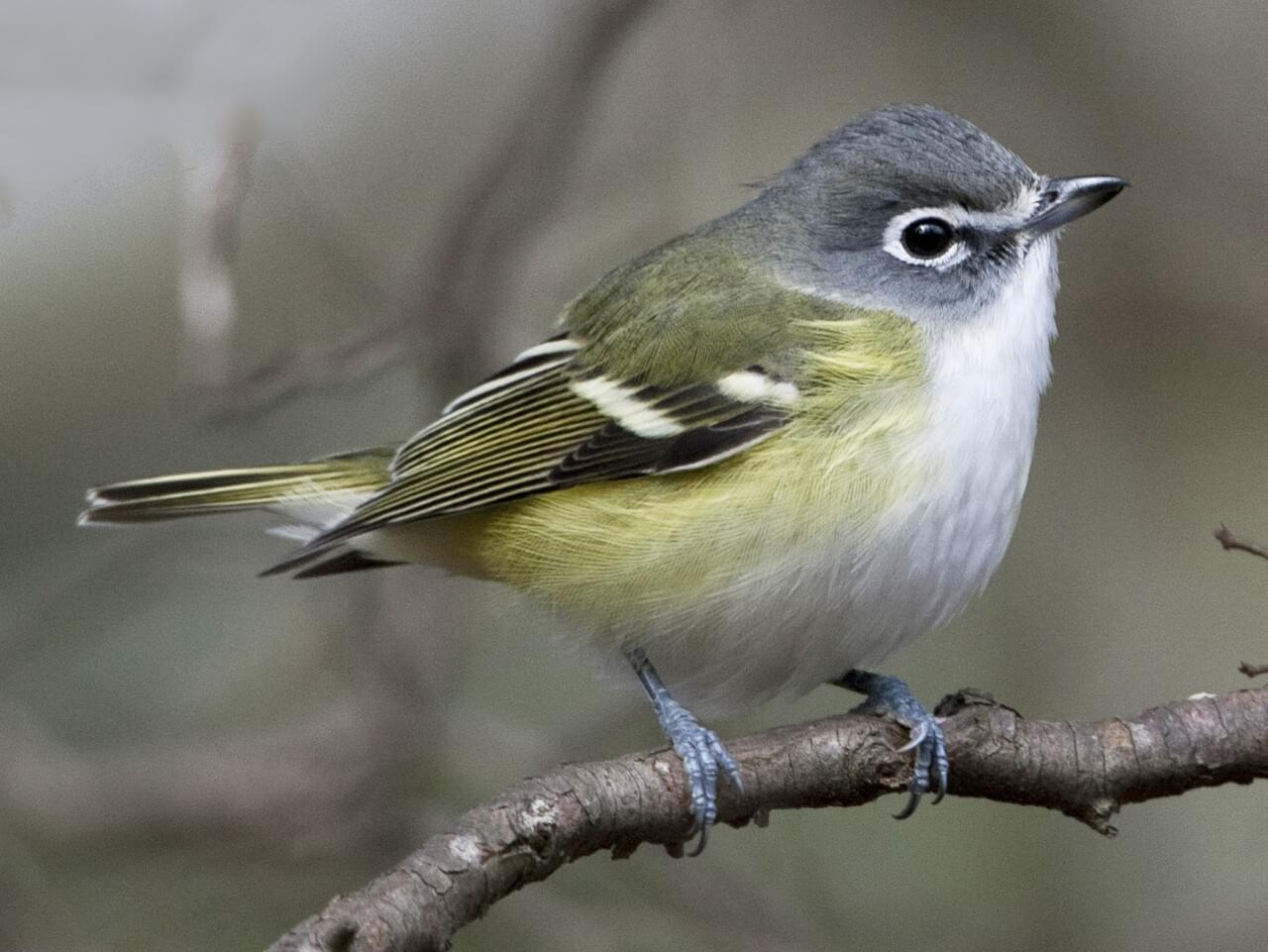 |
| Vireo solitarius (all about birds) |
Salix purpurea in Monroe's garden effete. Apparently blooms with our early willows; say 10th of April?
At Hosmer's medicinal (?) spring, Everett's farm, Ranunculus repens, abundantly out, apparently several days.
Hear of a peach out in Lincoln.
Probably I heard the black and white creeper April 25th. I hear it and see it well to-day.
Comptonia well out, how long?
Viola cucullata, how long?
Hear of robins' nests with four eggs.
See no signs of the Uvularia perfoliata yet; apparently will not bloom within ten days.
E. Hoar brings me a twig of a willow plucked in Newton, which was killed some weeks ago, when it had just begun to bloom. The catkins look peculiarly woolly, and the scales peculiarly rounded or blunt. Is it the eriocephala?
Our earliest gooseberry not yet, perhaps because there will be but few blossoms on it this year.
Partridges have been heard drumming.
In the woods near the Uvularia perfoliata, see and hear a new bird to me. At first it was silent, and I took it for the common pewee, but, bringing my glass to bear on it, found it to be
H. D. Thoreau, Journal, May 3, 1858
Ride to Flint's Pond to look for Uvularia perfoliata. ... It apparently will not bloom within ten days. See May 30, 1857 ("By the path near the northeast shore of Flint's Pond, just before reaching the wall by the brook, I . . .am surprised to find ... the Uvularia perfoliata, which I have not found hereabouts before. . . .. It is considerably past its prime “). See also note to August 22, 1857 ("He says he found the Uvularia perfoliata on the Stow road, he thinks within Concord bounds.”) and A Book of the Seasons, by Henry Thoreau, the Bellworts
Partridges have been heard drumming. See April 19, 1860 ("You will hear at first a single beat or two far apart and have time to say, "There is a partridge," so distinct and deliberate is it often, before it becomes a rapid roll."); April 25, 1854 ("The first partridge drums in one or two places, as if the earth's pulse now beat audibly with the increased flow of life. It slightly flutters all Nature and makes her heart palpitate."); April 29, 1857 ("C. says it makes his heart beat with it, or he feels it in his breast.") See also A Book of Seasons, by Henry Thoreau, the Partridge
Heard the black and white creeper April 25th. I hear it and see it well to-day. See April 28, 1856 ("I hear to-day frequently the seezer seezer seezer of the black and white creeper”); May 3, 1852 ("That oven-birdish note which I heard here on May 1st I now find to have been uttered by the black and white warbler or creeper. He has a habit of looking under the branches."); May 4, 1858 ("I hear the weese wese wese of the creeper continually from the swamp. It is the prevailing note there.") See also A Book of the Seasons, by Henry Thoreau, the Black and White Creeper
E. Hoar brings me a twig of a willow plucked in Newton, which was killed some weeks ago, when it had just begun to bloom. The catkins look peculiarly woolly, and the scales peculiarly rounded or blunt. Is it the eriocephala?
Our earliest gooseberry not yet, perhaps because there will be but few blossoms on it this year.
Partridges have been heard drumming.
In the woods near the Uvularia perfoliata, see and hear a new bird to me. At first it was silent, and I took it for the common pewee, but, bringing my glass to bear on it, found it to be
- pure white throat and beneath,
- yellow on sides of body or wings,
- greenish-yellow back and shoulders, a white or whitish ring about eyes,
- and a light mark along side of head,
- two white bars on wings,
- apparently black bill and
- dark or perhaps slate-colored (?) wings and above tail.
H. D. Thoreau, Journal, May 3, 1858
Ride to Flint's Pond to look for Uvularia perfoliata. ... It apparently will not bloom within ten days. See May 30, 1857 ("By the path near the northeast shore of Flint's Pond, just before reaching the wall by the brook, I . . .am surprised to find ... the Uvularia perfoliata, which I have not found hereabouts before. . . .. It is considerably past its prime “). See also note to August 22, 1857 ("He says he found the Uvularia perfoliata on the Stow road, he thinks within Concord bounds.”) and A Book of the Seasons, by Henry Thoreau, the Bellworts
Partridges have been heard drumming. See April 19, 1860 ("You will hear at first a single beat or two far apart and have time to say, "There is a partridge," so distinct and deliberate is it often, before it becomes a rapid roll."); April 25, 1854 ("The first partridge drums in one or two places, as if the earth's pulse now beat audibly with the increased flow of life. It slightly flutters all Nature and makes her heart palpitate."); April 29, 1857 ("C. says it makes his heart beat with it, or he feels it in his breast.") See also A Book of Seasons, by Henry Thoreau, the Partridge



No comments:
Post a Comment